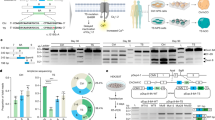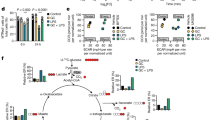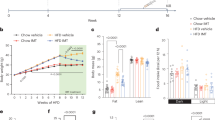Abstract
WE have been studying the mechanism of tyrosine amino-transferase (TAT) induction by adrenal steroids in hepatoma (HTC) cell cultures1,2. The hormones increase the rate of enzyme synthesis resulting in an increased intracellular TAT concentration3. The enzyme is continuously turning over with a half-time of degradation of 3 to 7 h (measured as loss of either enzymic or antigenic activity), depending on the experiment and the conditions.
This is a preview of subscription content, access via your institution
Access options
Subscribe to this journal
Receive 51 print issues and online access
$199.00 per year
only $3.90 per issue
Buy this article
- Purchase on Springer Link
- Instant access to full article PDF
Prices may be subject to local taxes which are calculated during checkout
Similar content being viewed by others
References
Thompson, E. B., Curran, J., and Tomkins, G. M., Proc. US Nat. Acad. Sci., 56, 296 (1966).
Tomkins, G. M., Thompson, E. B., Hayashi, S., Gelehrter, T., Granner, D., and Peterkofsky, B., Cold Spring Harbor Symp. Quant. Biol., 31, 349 (1966).
Granner, D. K., Hayashi, S., Thompson, E. B., and Tomkins, G. M., J. Mol. Biol., 35, 291 (1968).
Martin, jun., D. W., Tomkins, G. M., and Bresler, M. A., Proc. US Nat. Acad. Sci., 63, 842 (1969).
Garren, L. D., Howell, R. R., Tomkins, G. M., and Crocco, R. M., Proc. US Nat. Acad. Sci., 52, 1121 (1964).
Mandelstam, J., Bacteriol. Rev., 24, 289 (1960).
Williams, L. S., and Neidhardt, F. C., J. Mol. Biol., 43, 529 (1969).
Schimke, R. T., J. Biol. Chem., 239, 3808 (1964).
Kenney, F. T., Science, 156, 525 (1967).
Levitan, I. B., and Webb, T. E., Biochim. Biophys. Acta, 182, 491 (1969).
Reel, J. R., and Kenney, F. T., Proc. US Nat. Acad. Sci., 61, 200 (1968).
Jervell, K. F., and Leglen, P. D., Biochim. Biophys. Acta, 174, 398 (1969).
Dulbecco, R., J. Exp. Med., 99, 167 (1954).
Diadmondstone, T. I., Analyt. Biochem., 16, 395 (1966).
Lowry, O. H., Rosebrough, N. J., Farr, A. L., and Randall, R. J., J. Biol. Chem., 193, 265 (1951).
Tomkins, G. M., Gelehrter, T. D., Granner, D., Martin, D., Samuels, H. H., and Thompson, E. B., Science (in the press).
Author information
Authors and Affiliations
Rights and permissions
About this article
Cite this article
AURICCHIO, F., MARTIN, D. & TOMKINS, G. Control of Degradation and Synthesis of Induced Tyrosine Aminotransferase studied in Hepatoma Cells in Culture. Nature 224, 806–808 (1969). https://doi.org/10.1038/224806b0
Received:
Revised:
Issue Date:
DOI: https://doi.org/10.1038/224806b0
This article is cited by
-
Induction of placental alkaline phosphatase in choriocarcinoma cells by 5-bromo-2′-deoxyuridine
In Vitro (1977)
-
Some paradoxical effects of inhibitors of protein synthesis on protein turnover in cultured human cells
In Vitro (1976)
-
Heterokaryons in the analysis of genes and gene regulation
Humangenetik (1975)
-
Further Evidence for Posttranscriptional Control of Inducible Tyrosine Aminotransferase Synthesis in Cultured Hepatoma Cells
Nature New Biology (1972)
-
“Pleiotypic Response”
Nature New Biology (1971)
Comments
By submitting a comment you agree to abide by our Terms and Community Guidelines. If you find something abusive or that does not comply with our terms or guidelines please flag it as inappropriate.



